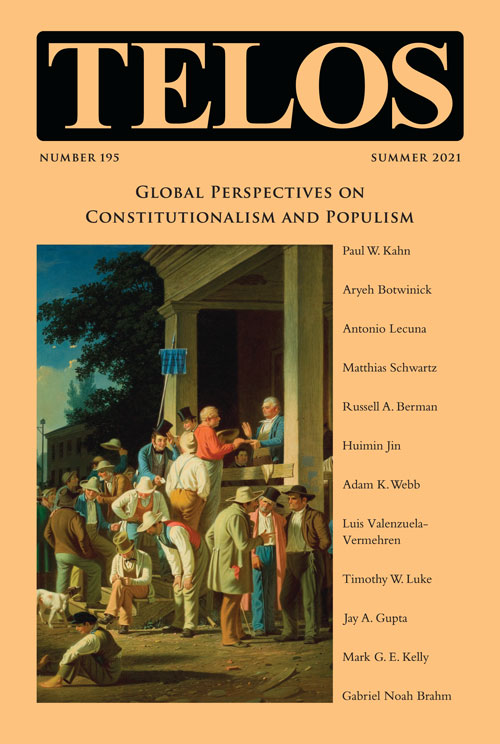The Telos Student Seminars provide a forum for students around the world to engage with critical theory by discussing a common set of paired texts from Telos—one current essay and one pertinent essay from our archives. The following reports from our first Telos Student Seminars at Concordia University in Irvine, California, and the Hopkins-Nanjing Center in Nanjing, China, compare Paul Kahn’s “Law and Representation: Observations from an American Constitutionalist” (Telos 195, Summer 2021) and Paul Piccone’s “The Crisis of Liberalism and the Emergence of Federal Populism” (Telos 89, Fall 1991). The Irvine seminar advocates addressing the political challenges highlighted by Kahn and Piccone through a new American civil religion “built on mysticism,” while the Nanjing group took the seminar as an occasion for a wide-ranging, cross-cultural discussion about society and politics. Telos Student Seminars participants across the globe will gather virtually for a discussion with Paul Kahn at the end of this month. For more details about the Telos Student Seminars, including summaries of the two essays under discussion, click here.
|
The Telos Student Seminars provide a forum for students around the world to engage with critical theory by discussing a common set of paired texts from Telos—one current essay and one pertinent essay from our archives. The following reports from our first Telos Student Seminars in Budapest, Hungary, and Haifa, Israel, compare Paul Kahn’s “Law and Representation: Observations from an American Constitutionalist” (Telos 195, Summer 2021) and Paul Piccone’s “The Crisis of Liberalism and the Emergence of Federal Populism” (Telos 89, Fall 1991). The Hungarian seminar turned its attention to the relevance of political theology in the context of Viktor Orbán’s dismantling of liberal democratic institutions, while the Haifa seminar explored whether the essays by Kahn and Piccone “suggest a liberal, populist, or conservative solution to the crisis of the liberal state.” For more details about the Telos Student Seminars, including summaries of the two essays under discussion, click here. In today’s episode of the Telos Press Podcast, David Pan talks with Aryeh Botwinick about his article “Contra Originalism: The Elusive Text” from Telos 195 (Summer 2021). An excerpt of the article appears here. In their conversation, they discussed the doctrine of originalism in constitutional theory, the role of the Bible in Western legal and constitutional history, the relation between originalism and skepticism, Derrida’s weak messianism, the way that Derrida’s skepticism undermines itself through the category of the gift, the relationship of originalism to the paradox of sovereignty, and the reason why Hobbes’s statement that “life is motion” is the only defensible phrase. If your university has an online subscription to Telos, you can read the full article at the Telos Online website. For non-subscribers, learn how your university can begin a subscription to Telos at our library recommendation page. Print copies of Telos 195 are available for purchase in our online store. In today’s episode of the Telos Press Podcast, David Pan talks with Adam K. Webb about his article “Supranational Governance and the Problem of the ‘Dignified Constitution,’” from Telos 195 (Summer 2021). An excerpt of the article appears here. Their discussion covers a range of topics, including the difference between the dignified constitution and the efficient constitution, the lack of a dignified constitution in supranational institutions like the EU and the UN, the domination of these institutions by the new class elite, the possibility of a global demos, the opposition of dignified constitutions to technocratic views of government, the insularity of some traditionalist arguments, and the current prospects for a broad global coalition. If your university has an online subscription to Telos, you can read the full article at the Telos Online website. For non-subscribers, learn how your university can begin a subscription to Telos at our library recommendation page. Print copies of Telos 195 are available for purchase in our online store. Telos 195 (Summer 2021): Global Perspectives on Constitutionalism and Populism is now available for purchase in our store. Individual subscriptions to Telos are also available in both print and online formats.
In today’s episode of the Telos Press Podcast, Camelia Raghinaru talks with Takahiro Nakajima about his article “Constitutionalism and Sovereignty: On Constitutional Problems in Japan,” from Telos 189 (Winter 2019). An excerpt of the article appears here. If your university has an online subscription to Telos, you can read the full article at the Telos Online website. For non-subscribers, learn how your university can begin a subscription to Telos at our library recommendation page. Purchase a print copy of Telos 189 in our online store. |
||||
|
Telos Press Publishing · PO Box 811 · Candor, NY 13743 · Phone: 212-228-6479 Privacy Policy · Data Protection Copyright © 2024 Telos Press Publishing · All Rights Reserved |
||||








